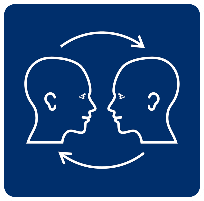- Where can I get training on AAC? Will it cost and will I have to pay for it?
The type of course you choose will depend on your role and which elements of AAC you want to be trained in. Our website is full of information for people who are new to AAC. We also publish a number of “Focus on…” leaflets that provide a very simple introduction to various aspects of AAC. Costs of training courses vary and you would generally have to pay any fee yourself.
Local FE colleges often run part-time or evening training courses on signing, for the deaf community or for other augmented communicators. If you work with children who sign, it is worth asking your child’s school and/or speech and language therapy department about any courses they might run.
There is limited formal training available in the use of symbols for communication:
- CALL Scotland runs courses on the use of symbols in schools
- Talking Mats offers one day training courses around the UK
- Makaton reps run training workshops in signs and symbols around the UK, or again, ask your local team about specific training for your needs
- Widgit and Picture Communication Symbols (PCS) provide on-line training in the use of their symbol software
- Elklan runs a number of courses for parents, teachers, therapists and practitioners working with children and adults with complex communication needs, and those who use AAC. These courses are externally accredited through APT Awards. Accreditation is dependent on completion of a portfolio.
If you are seeking training in a specific hi-tech voice output communication aid (VOCA), and you are working with individual VOCA users, the company supplying the system will probably be able to offer some training, at least initially. Many suppliers have or are developing online training resources. The therapists and/or specialist teachers working with the VOCA user should be able to offer either formal training or informal support in how to use their device.
Some AAC specialist assessment centres run training courses for both families/carers and professionals.
If your local speech and language therapy or education team has recommended a particular strategy or system, they should be able to offer you group or individual training and support in the use of these.
- Does Communication Matters provide any training?
We offer a range of training events including Information Days, Study Days and our annual Conference.
The Information Days are a useful way to get an overview of what is available and to talk to suppliers. Some of these companies run free information days or workshops that give an overview of their products. Our occasional Study Days cover more specific topics such as literacy or eye-gaze.
The Communication Matters Conference is an annual event where people who use AAC, family members, carers and professionals meet to exchange information and ideas, both formally and informally. Among the many different presentations, some are aimed specifically at people who use AAC. There is also an exhibition at which many AAC suppliers demonstrate their systems.
- How do I know it is the right training for me?
Take advice from professionals working with you and your family.
- Who can support me to find the right training?
Speech and language therapists, AAC specialists in education, AAC specialist centres, communication aid suppliers, AAC users and their families and carers.
- I seem to know more than the professionals about AAC – what training do they get?
Newly qualified professionals have a generalist training in their chosen discipline. People who specialise in AAC usually develop their knowledge through additional training, both formal and informal, while working. Not all local areas currently have specialists in AAC.
Post-qualification courses in AAC are available at Dundee and Manchester Metropolitan universities and the ACE Centre.
Recent training-related initiatives
The new NHS England commissioning of specialised AAC services aims to develop local teams, supported by regional hubs in England, that will support the needs of the majority of AAC users in their areas.
NHS Education for Scotland has developed IPAACKS, which “describes the core values required of those who work with people who use AAC or people who may benefit from AAC. In addition, IPAACKS presents the AAC specific knowledge and skills that workers should aspire to achieve in relation to the role they play in supporting individuals who use AAC”. It provides a framework for workers to develop their knowledge and skills so that they can better support people who use AAC. The package is available online and could be useful to health, education and social care staff working with people who use AAC throughout the UK.
The AACScotland website contains many ideas, resources and links about AAC. AACScotland has also developed a series of five online learning modules aimed at people who are new to AAC.
See also
- FAQs – AAC and Autism Spectrum Disorder (ASD)
- FAQs – AAC and cerebral palsy (CP)
- FAQs – AAC and developmental difficulties
- FAQs – AAC and employment
- FAQs – AAC and general paediatric care
- FAQs – AAC and hospitalisation
- FAQs – AAC and locked-in syndrome
- FAQs – AAC and Parkinson’s Disease (PD)
- FAQs – AAC and stroke and aphasia
- FAQs – AAC and training
- FAQs – AAC assessment and clinical decision-making
- FAQs – the law, policy and services





